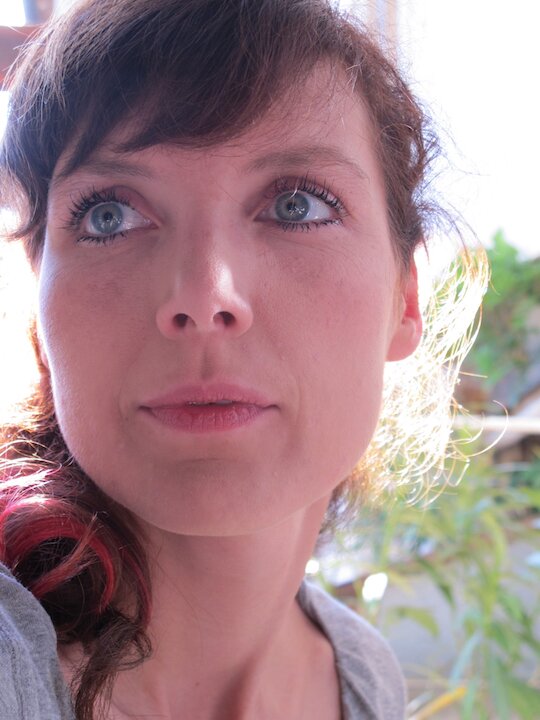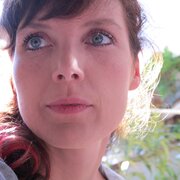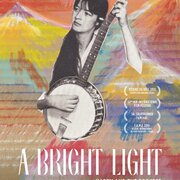Interviewed & Written by Sana Rizvi
On a wild and enchanted journey from Colorado to Woodstock, three women search for the sixties' most astonishing voices, adulated by her peers, but unknown to the general public- Karen Dalton. Along the way, they encounter those who knew her as well as those whom she still haunts and influences today.
A Bright Light: Karen and the Process is a documentary made of music and art that questions the creative process.
The film draws the portrait of this exceptional artist, furiously free, who refused the system and its compromises. Through this iconic figure, the documentary follows the quest of a certain freedom of life and expression and independence for better or worse.
Born in Lausanne, Emmanuelle Antille studied at the ESAV in Geneva and at the Rijksakademie in Amsterdam. Over more than two decades, she has developed her artistic practice as a video artist and film director exploring the bonds between people within a community and family. A Bright Light' is her first feature-length documentary. In Antille's words, the film was created as fireworks, a kaleidoscope with style breaks, to give an impression of permanent research. We filmed with an HD camera, a Super 8, a mini DV and a mobile phone. These different qualities of images echo the different ways of approaching reality, travel and transposing Karen's story.
WOMEX Film's Sana Rizvi, caught up with Emmanuelle Antille to learn more about her professional and personal journey while making her first documentary. For those of you who missed watching the film at WOMEX, you have exclusive access in November to watch this beautiful film through WOMEX Films on Demand. More information here on how to watch films in the Films on Demand section.
The film is far from a traditional biopic or a chronological reconstruction of an artist's life. Could you tell us about how you decided on this particular storytelling process for the film?
Emmanuelle Antille : True. The starting point for this project is more of a dialogue with an artist, a voice, with Karen Dalton. Initially, I wanted to talk about creation, its process and our relationship to the world through the figure of an artist. The central questions were: How does the creative gesture unfold? How far can the desire to question the world lead us? What are we willing to sacrifice to achieve our deepest aspirations? These are questions that have always accompanied me and have only intensified over time. But beyond an artistic practice, fundamental questions on the meaning of life and what is left behind once we are gone, are also looked into through the film. That is why the title of the film is A Bright Light- Karen & The Process and not, A Bright Light- Karen Dalton.
Do you still remember how you felt when you first heard Dalton's song, on a bus journey?
Emmanuelle Antille : Oh yeah! Her voice so moved me. It was like a revelation! Her voice spoke to me on so many levels at the same time. It has so many layers in it, almost like a character. It is full of emotions, density and depth. It tells one about hope, pain, desire, resilience. When you listen to it, you can tell that this is the voice of a person who had lived many lives! Sweet Substitute was the song I heard that day, and it remains my favourite to date.
What was it that made you think of making a documentary on the same? Could you take us through the steps of the search process and also tell us more about your road trip through America, the people you met on the way?
Emmanuelle Antille : When I happened to hear one of her songs, Sweet Substitute , I was immediately struck by her exceptional voice. It carried a story, a mystery capable of overturning us beyond time. I investigated and found out that she was completely unknown to the general public, but praised by Nick Cave and Bob Dylan, among others. She had been the muse of Greenwich Village in New York in the 1960s and had lived in abandoned gold mines. It was fascinating. Digging deeper, I quickly realised that there was little information about her; no interviews, only 10 minutes of the film and still the same 5-6 photographs. I then decided to investigate to gather as much material as possible about her life, her friends... and also to find out why such an extraordinary talent had remained unknown. This reconstitution lasted two years.
With all the information gathered and convinced that her work resonated perfectly with my initial questioning, I contacted her friends and decided to meet them. I put together a small team; Carmen Jaquier for the camera and Malika Pellicioli for the sound, and we left for thirty-three days of shooting across the United States.
It's been a great adventure! It was just the three of us with our cameras, microphones, 150 kilos of luggage and a big car. We drove eight thousand kilometres and met incredible people on the way.
We had prepared the trip well in advance. Everyone we interviewed was waiting for us across the country, the course had been marked out, and our suitcases packed with all the needed equipment and accessories. There were fabrics, masks, a DIY kit... and even Bengal fires! Everything had been carefully prepared to be ready for the unexpected, the surprises, of which there were many. All participants shared with us much more than we expected. I also requested many of the musicians to share their visions of music and creation in front of the camera. By the way, you can check out the film's website to know more about the other participants and our journey as we shot so many great moments, and we couldn't put everything in the film. We had an incredible adventure, and it stands out in the film and on the website.
How do you feel post making the film and answering the question, "Where one must draw the line in creative work between one's private life and one's artistic practice?"
Emmanuelle Antille : I never draw any line between the two, and I never separated things. It is a whole. Art is a passion, a way of living, breathing and looking at the world. You have to be involved and defend values. It is a very political involvement as well on many different layers. This project is about the margin as well, of a fantastic talent unfairly left on the sidelines. I am also very proud to have been able to involve and hire a lot of women in this project. It is vital for me. As a woman, you have to fight so much harder to follow your dreams and make them realities.
Your comrades in the film, the sound-engineer and camerawoman. Was it intentional to make this also somehow a story of sisterhood as well rather than a solo journey?
Emmanuelle Antille : Of course. As the idea in the film was to question the creative process, we worked closely together and constantly asked this question to ourselves and our collaboration. Both Carmen Jaquier and Malika Pellicioli are also film directors, so by choosing to collaborate with them, the idea for me was to create a field of exchange, a situation where we three could share energy and the creative process. And then see how far we could go.
A lot of your work as well looks at the fine line between dreams and reality/ real and unreal. Could you elaborate a bit on how your previous works influenced the cinematography of the film?
Emmanuelle Antille : A Bright Light gathers a lot of my ideas of the past years. I loved doing this project, the investigation aspect, the exchange with the musicians. The fact that there was almost nothing about Karen Dalton forced us to be very creative to make her alive, to invent material to find another way to tell her story. Like a fiction, or a waking dream, but more intense, thanks to the fabulous encounters and the involvement of all the participants. In the film, one of the participants said about a song he wrote, "It is about when you go to sleep, and you don't know if you're asleep. And you wake up, and you're in the state of semi-conscious, where you think you know somethings that happened, but you're not sure that they have actually happened."
I like this sentence a lot.
I read somewhere that you are also a singer and musician! Tell us more of all these other talents?
Emmanuelle Antille : I studied music a long time ago, I sang once or twice for small projects, but I respect too much the musicians to pretend to be one of them. I work a lot with music. For every project, I collaborate with musicians, composers and I think I can be useful as a producer, to edit and give inputs and associate sounds and images, but definitely not for the interpretation and the composition parts of the music. I really cherish musicians and the incredible gift they have to be able to create, imagine musical phrases or sounds. I think that it is the most important art form on earth.
What music are you listening to nowadays, and what are you working on currently?Emmanuelle Antille : I like very different styles of music but in a very defined way. I am a massive fan of Steve Albini, for example. I admire the way he works as a musician, but mainly as a producer. These days I listen a lot to Koffee, the Jamaican singer. This is dancehall music. Her voice and rhythmic way of singing are great and fresh. I have also been listening to a lot of the songs Alan Lomax recorded- very traditional ones.
Emmanuelle, why should WOMEXicans watch the film and what do you hope they will get out of it?
Emmanuelle Antille : Immense joy and a sense of freedom. The pleasure to discover or hear the incredible voice of Karen Dalton again and feel the spirit of freedom in how the creative process can open doors and connections. In the end, everything is interconnected when looking at things by making free associations. Harry Tuft said a beautiful sentence in the film, "Music is a conduit to feelings, emotions and values as well. So when you find someone who enjoys the same kinds of songs that you do, there's just a natural affinity." I am trying here to share values and emotions, and music is the best conduit ever created for it. I also hope as many people as possible will discover or rediscover this amazing artist Karen Dalton.
article posted by:Sana Rizvi, Piranha Arts




